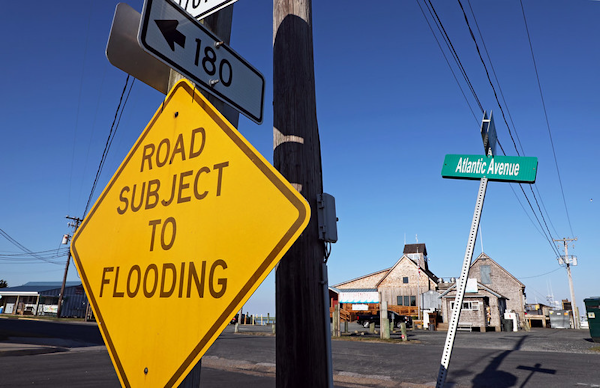SEJournal Online is the digital news magazine of the Society of Environmental Journalists. Learn more about SEJournal Online, including submission, subscription and advertising information.
 |
| A road sign warns of flooding in Wachapreague, Virginia in 2018. Photo: Virginia Sea Grant via Flickr Creative Commons (CC BY-ND 2.0). |
TipSheet: Reporters Can Address Uncertainty Over Local Risk of Rising Seas
By Joseph A. Davis
Climate heating is raising the sea level and though it can be argued whether it will rise slower or faster (or cataclysmically), people living along the coasts will need to pay close attention.
With the resulting escalation in flood risk, a key determination is knowing when to evacuate (and where to go).
But the answer will not be the same for everyone. So part of the work of environmental journalists is to help explain.
Why it matters
Although coastal counties represent only 10 percent of the total U.S. land area, they are home to some 40 percent of the U.S. population, according to the National Oceanic and Atmospheric Administration, or NOAA.
We got one glimpse of that reality when in 2005 Hurricane Katrina-driven storm surges penetrated the levees protecting New Orleans, overall killing almost 1,400 people and causing nearly $200 billion in damage.
The Galveston hurricane of 1900 was even worse, killing over 6,000 people.
Not every coastal flooding event involves massive loss of life. But when people lose their houses and their livelihoods it’s still an important story.
The backstory
As a general matter, there is probably not enough public concern about coastal flooding. But too much of the wrong kind of concern can be almost as bad as too little of the right kind.
The recent Washington Post piece by Chris Mooney and Brady Dennis posits an unusual surge in coastal flooding along the U.S. Southern and Gulf Coasts. Most alarming are the scientific articles it cites to support the idea that sea level rise is suddenly getting much worse in these areas.
It probably is — but it would be hard to say the problem is currently well understood. For one perspective, the recent book “Charleston” (reviewed in The New York Times; may require subscription) argues that racial injustice is behind much coastal catastrophe.
But there is more to it than that. Theoretically, sea level rise is evened out globally by the water in the ocean. But it isn’t. Land or uplift subsidence (such as seen in south Louisiana as a result of oil and other resources pumped out of it) are among several things causing apparent sea level rise to vary from place to place.
Because sea level change has
so many squishy ifs and buts,
satellites can help us measure
sea level rise more precisely.
Because sea level change has so many squishy ifs and buts, satellites can help us measure sea level rise more precisely (although they also record the confounding variations). It’s a good guess that right now sea level is rising by about 3.6 millimeters per year.
Sea level rise does arguably hurt poor people more, if only because it is harder for them to rebuild. But along the Delaware and Carolina coast, a lot of rich people have built their summer second homes right up against the beach. A good hurricane could wash them away.
See the movie “Beasts of the Southern Wild,” which is set in Bathtub — otherwise known as Isle de Jean Charles in Louisiana, an area that is being abandoned because of climate change.
Another example is the Gullah Geechee coastal lowlands of South Carolina and nearby states. Residents, descended from enslaved people, have developed a vibrant culture to promote resiliency on their lands, but in the long term, they will face coastal flooding, too.
Story ideas
- What is the history of coastal land development in your community? Who lives there? When did they come? What did they build?
- What industries are based in your community? Fishing? Mariculture? Recreation? Tourism? Shipping? Energy?
- Is your community subject to tropical cyclones and other storms? What areas would be inundated by such storms and related surges?
- Is there land subsidence in your coastal community? What causes it? How does it relate to sea level rise?
- How does erosion factor into your coastal flooding equation? Are coastal land structures like barrier islands being destroyed or degraded?
Reporting resources
- National Storm Surge Risk Maps: Maintained by NOAA, these maps are kept up to date amid the latest predictions.
- Federal Emergency Management Agency: FEMA keeps risk maps for coastal flooding, and also runs flood resilience programs and maintains flood insurance rate maps.
- U.S Climate Resilience Toolkit: This multi-agency project is run by NOAA for the U.S. Global Change Research Program.
- C40 Cities: This international program includes mayors of major cities that have committed to acting for coastal resilience.
- U.S. Centers for Disease Control: The CDC sees coastal flooding as a significant threat to public health and offers safety suggestions.
Joseph A. Davis is a freelance writer/editor in Washington, D.C. who has been writing about the environment since 1976. He writes SEJournal Online's TipSheet, Reporter's Toolbox and Issue Backgrounder, and curates SEJ's weekday news headlines service EJToday and @EJTodayNews. Davis also directs SEJ's Freedom of Information Project and writes the WatchDog opinion column.
* From the weekly news magazine SEJournal Online, Vol. 8, No. 17. Content from each new issue of SEJournal Online is available to the public via the SEJournal Online main page. Subscribe to the e-newsletter here. And see past issues of the SEJournal archived here.










 Advertisement
Advertisement 



